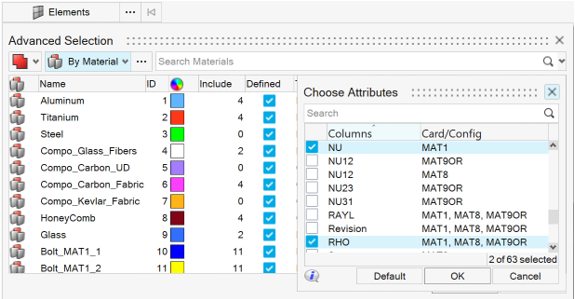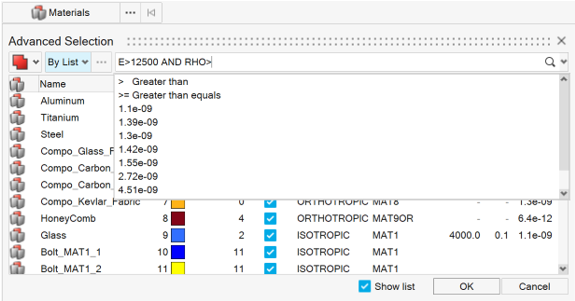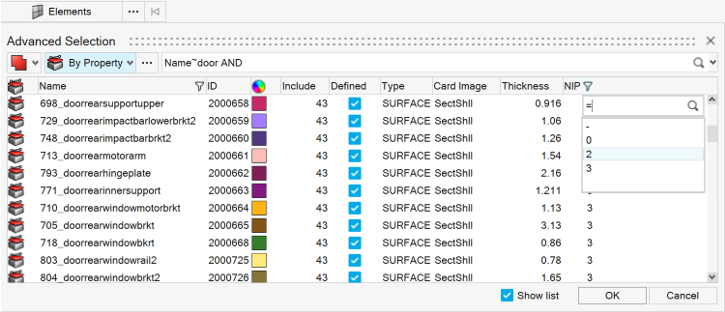Perform Extended Entity Selection
Use extended entity selection to find, filter, and select subsets of entities. Extended selections can be added to, removed from, or intersected with existing selections, and previous selections can be also saved and retrieved.
Extended Entity Selection Options
The following options are available for extended entity selection.
Context Menu Options
- Displayed
- Select all entities of the specified type currently displayed in the modeling window.
- Reverse
- Allows for a Boolean "not" to be performed on the currently displayed entities; all selected entities are removed from the mark; all entities which are not on the mark and are currently active are selected.
- All
- Select all entities of the specified type. The set to be added to the user mark includes entities displayed and those not displayed.
- Adjacent
- Select entities adjacent to the entities already selected.
- Attached
- Select entities by specifying an entity among a large group of continuously connected elements. The application includes the entities currently displayed that are attached to the entities already selected. Entities that are not displayed will not be selected although they may be attached to the entity selected.
- Face
- Select entities that are located on the same surface face as the previously selected entity. The application finds entities that are attached to each other without crossing a feature line. Attached, adjacent surfaces, nodes, or elements are progressively selected when the angle between them is less than or equal to the specified feature angle.
- By Dimension
- Select entities by dimension (0D, 1D, 2D, and 3D). You can select one or more of the dimensions available.
- Similar
- Select entities that are similar to the your current selection based on config.
- Clear Selection
- Remove all entities from your active selection.
- Save Selection
- Save the currently selected entities to a holding area known as the user mark.
- Retrieve Selection
- Retrieve previously saved entities from the user mark.
HyperMesh Advanced Selection Dialog Options
- By Assembly
- Select entities by assembly.
- By Block
- Select entities associated with one or more block entities.
- By Collector
- Select elements, lines, surfaces, loads, coordinate systems, vectors, equations, and points by collector.
- By Component
- Select entities by component.
- By Config
- Select elements by configuration and type. The element type is dependent on the template file.
- By Connector Group
- Select entities associated with one or more connector groups.
- By Domains
- Select entities associated with a morph domain.
- By Edge
- Select entities (nodes, elements) by surface edge. HyperMesh finds entities that are attached to each other without crossing a feature line. The feature line can be adjusted using the Angle slider. Attached, adjacent surfaces or elements are progressively selected when the angle between them is less than or equal to the specified feature angle.
- By Face
- Select entities that are located on the same surface face as the previously selected entity. The application finds entities that are attached to each other without crossing a feature line. The feature line can be adjusted using the Angle slider. Attached, adjacent surfaces, nodes, or elements are progressively selected when the angle between them is less than or equal to the specified feature angle.
- By Group
- Select entities by group.
- By Handles
- Select entities associated with morphing handles.
- By ID
- Select entities by typing in their ID numbers.
- By Include
- Select FE entities such as elements, loads, and groups that belong to
the selected include.Note: Includes created via the Model Browser are only valid for solvers that support them.
- By Laminate
- Select entities associated with one or more laminate entities.
- By Limits (3D)
- Using this method, selection propagates to all connected faces selected,
while excluding faces that are connected to the specified limit nodes.
Limit nodes must be selected first to enable the propagating faces
selector.Note: This method is only available when the selection type is faces or facets.
- By Line
- Pick lines in the modeling window. Entities associates with the lines are selected.
- By List
- Select entities from a list.
- By Material
- Select entities by material.
- By Morphing Volumes
- Select entities associated with morphing volumes.
- By Multibodies
- Select entities associated with one or more multibody entities.
- By Output Block
- Select the nodes, elements, comps, systs, groups and mats within an outputblock.
- By Part
- Select entities associated with a part.
- By Path
- Pick multiple nodes, lines, or elements and select all the nodes/lines/elements that fall in the closest connecting path. If you select two nodes on a free edge of some elements, the function tries to find the closest path along that free edge. This function uses the connectivity of the elements between the nodes, and thus requires the selected nodes to be part of a continuous shell mesh. Similarly, By Path for lines uses the connectivity of surfaces/solids and thus requires the selected lines to be surface/solid edges.
- By Plane
- Use the graphics area to define a plane using the Vector/Plane tool, and select entities on this plane, or normal to it.
- By Ply
- Select entities associated with one or more ply entities.
- By Points
- Pick points in the modeling window. Entities associates with the points are selected.
- By Property
- Select entities by property.
- By Set
- Select the entities within a set.
- By Solid
- Pick solids in the modeling window. Entities associates with the solids are selected.
- By Surface
- Pick surfaces in the modeling window. Entities associates with the surfaces are selected.
- By Width
- Select surfaces by width, either by picking a sample surface or by specifying a range of values for the width.
HyperView Advanced Selection Dialog Options
All selection methods in the dialog include a visibility filter. This allows you to apply your settings to all entities in the model, regardless if they are displayed on the screen or not, or only the entities that are displayed.
In addition,HyperView is capable of entity binding changes between nodes, elements, and components - which provides you with easy selection. For example, when Nodes is specified on the entity selector, the By ID option allows you to select either By Node ID, By Element ID, or By Component ID.
- By ID
- Select entities by entering an ID number.
- By Type
- Select elements by configuration. You can select one or more of the various element configurations available.
- By Sets
- Select the entities within a set.
- By Contour
- Select entities by contour.
- By Sphere
- Allows you to select entities by entering location information for x, y, z and a user-defined radius.
Attribute Columns
Add attributes to the selection dialog as columns to facilitate sorting and efficient identification of entities.
Add attribute columns to the Advanced Selection dialog by right-clicking on the column headers and selecting More. A dialog containing a list of the available attributes for the specific entity type is shown, from which the column's visibility can be controlled. Once a column is added to a particular entity-based selection method, it is available across all the entity selectors that refer to that selection method.

Figure 1.
Column Filtering and Search
Search and filtering attribute column data in the selection dialog.
Define search filters inside the selection view to identify entities based on known attributes. Quickly search by directly typing the entity name or ID in the search bar or perform an advanced search by interactively building the search string using the column data. Click on the text field of the search bar to access a dynamic suggestion list that assists in building an advanced search string.

Figure 2.
Click the filter icon on the column header to apply a quick filter directly to the columns.

Figure 3.
Refer to the browser documentation for more information on search and filtering.
 to
view more options.
to
view more options.